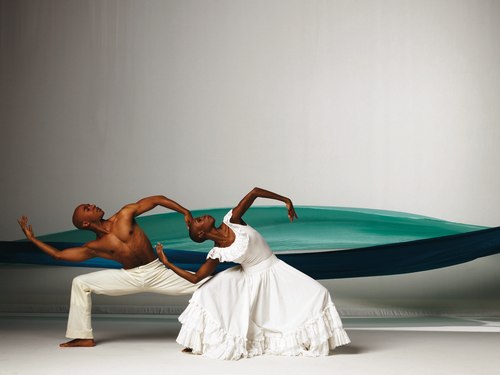|
 |
|
|
 |
 |
Its no wonder audiences around the world who watch the Alvin Ailey American Dance Theater (AAADT) are fascinated, amazed and fully satisfied with their choice of entertainment for the evening. The company has a history of creating this effect and the 50th Year Anniversary so eloquently continued the tradition. The organization pulled out all the stops in commemorating the occasion: arranging for the Empire State Building lights to shine gold on opening night of the NY City Center season; Oprah Winfrey hosting the opening night Gala; an Ailey Barbie doll designed by Judith Jamison wearing the white Revelations dresses from "Wade in the Water;" and, a beautifully photographed Andrew Eccles book entitled Ailey Ascending: A Portrait in Motion. The company also created a special anniversary film, "Alvin Ailey American Dance Theater at 50 – A Golden Anniversary Celebration," shown at the beginning of each performance. The film provided a complete intro into what is Ailey, showing footage of Alvin Ailey dancing and the start of the company in their first performance in 1958 at the 92nd Street Y. What a treat to see these archives as this footage is not always accessible to the general public. The Ailey Anniversary program was so wonderfully crafted to fully capture the development of AAADT and the magical energy that has developed from humble beginnings. An awe-inspiring view into the development of Alvin Ailey's choreography, this program highlighted the company's unique characteristics and the world of a true pioneer of modern dance. The following is my view into how Alvin Ailey evolved: Blues Suite (1958) – Beginning with Ailey's first masterpiece, this number was first danced at the 92nd Street Y. The excerpts, Good Morning Blues and I Cried (solo by Clifton Brown), were danced to spirituals which he called "hymns to the secular regions of the soul." The movement style - fluid, sharp, ethnic and eluding agony and words expressed in the spirituals – must have been unique to audiences familiar with other famous modern dance choreographers of that time. Streams (1970) and Choral Dances (1971) – More balletic than I would have imagined, these excerpts did not fail to prove the strength, flexibility and versatility of an Ailey dancer. They also showcased noticeable technique of Ailey's mentors Martha Graham and Lestor Horton. Mary Lou's Mass (1971) – This jazzy solo danced by Gwynenn Taylor Jones, was the result of a masterful collaboration with Mary Lou Williams, the "Queen of Jazz." Jones was a great choice as her long, lean frame and strong ballet technique embraced the sounds of Mary Lou in this beautiful solo. The Lark Ascending (1972) and Hidden Rites (1973) – Both of these excerpts were light, airy, sharp, tribal and quick. The movement constantly transitioned and flowed from step to step and from lift to lift. The athleticism characteristic of Ailey dancers was evident in these two numbers. Night Creature (1974) – Here we go, this is the one, this is Ailey. The hippy walks, body undulations, "spirit fingers," hip bops – this number had them all, as well as the jazzy, catlike and sassy rhythms. Cry (1971) – I can always imagine Judith Jamison dancing this number. The style of the choreography is so free and liberating. Its time to get down, spill it out, "mother save your child." Ailey definitely put his soul into the choreography behind this number which he created for his mother as a tribute to all women. Phases (1980) and Landscape (1981) – Both excerpts captured Ailey's ability as a choreographer to showcase femininity versus masculinity as well as his ability to capture mood and the depth of feeling. For Bird – With Love (1984) – A tribute to Charlie Parker "Bird" and Dizzy Gillespie. It would be amazing to see the full ballet. A phenomenal cast of dancers with an elaborate set embark on displaying the roles of each member of a jazz band. Clifton Brown and Kirven J. Boyd were phenomenal in their portrayal of "Bird" and Gillespie. Ailey was very creative with how he incorporated the instruments, their role and the movement into this beautiful masterpiece. Caverna Magica (1986) – A wonderful solo by Antonio Douthit blending jazz, ballet and modern. Opus McShann (1988) – This final choreographic work of Ailey showcases a delightful blend of signature moves within swing, lindy-hop and jitterbug. The partnering needed for social ballroom dances is different than that needed for pas de duex and other types of contact within modern movement and this excerpt was the only number with which the Ailey dancer was not comfortable. However, it would be wonderful to see the full ballet as these dance styles were essential to the jazz movement and musicians to whom Ailey found dear. Revelations (1960) - The anniversary highlight program would not have been complete without Revelations and as always this tribute to the African-American culture and Ailey's genius as a choreographer did not fail to deliver. The signature number for Ailey, Revelations is a perfect blend of all the characteristics that define Ailey – passionate, soulful, jazzy, sultry, strong, athletic and powerful. It is truly a masterpiece. Alvin Ailey always brought so much passion, hope, versatility and culture to each of his ballets. He was indeed a masterful choreographer worthy of his historic recognition.
 Matthew Rushing and Dwana Adiaha Smallwood in Revelations by Alvin Ailey Photo © & courtesy of Andrew Eccles |
|
 Dwana Adiaha Smallwood in Cry by Alvin Ailey Photo © & courtesy of Andrew Eccles |
|
|
|



